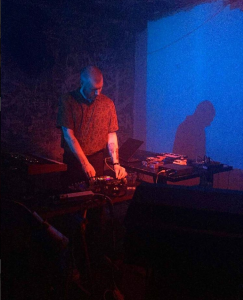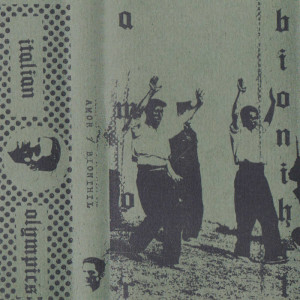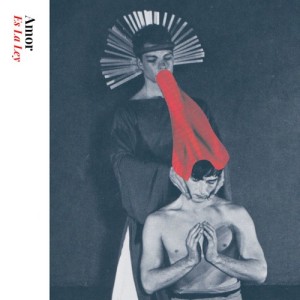Published by Davide Pappalardo on October 16, 2018
 Ryan Kent is the mind behind the experimental labels Holy Geometry and Italian Olympics, two new realities delivering engaging music rooted in industrial, EBM, post-punk and synth sounds. We have recently reviewed Holy Geometry’s cassette Es La Ley by Amor, a love letter to Throbbing Gristle and Suicide, and now we are going to interview Ryan about the past, the present, and the future of his two imprints.
Ryan Kent is the mind behind the experimental labels Holy Geometry and Italian Olympics, two new realities delivering engaging music rooted in industrial, EBM, post-punk and synth sounds. We have recently reviewed Holy Geometry’s cassette Es La Ley by Amor, a love letter to Throbbing Gristle and Suicide, and now we are going to interview Ryan about the past, the present, and the future of his two imprints.
Hi Ryan! Thank you very much for your time. Let’s go straight to the point: Holy Geometry is a new label which started its activities in 2017. It has already an interesting and growing roster, showcasing names like Amethyst, Vito Lucente, Anasisana, and so on, dedicated to experimental electronic music. Would you like to tell us more?
The very first thought behind Holy Geometry was as a platform to release my own work in a physical format (I make music under the name Sofia Ozdravovna). But then I’d already agreed to release my first album on Audio Visuals Atmosphere a few months earlier so it turned out it wasn’t so necessary to use HG as a way of ‘legitimising’ my work. Soon after I’d met and spoke with some other people about releasing their music on tape. Magnus, who does Amethyst, I met when he bought a sampler from me and we got talking about noise music. It made sense he was one of the first HG releases. After that it progressed very quickly and everyone I spoke to about the label was very receptive to the idea of being involved. I’m very proud of everything that has been released so far. Aside from the music, Holy Geometry is very focused on a strong visual aesthetic. From the beginning the aim was to create an identity through sound and art and so each release so far, bar two, has come from analog collages sourced and put together by myself to, hopefully, give it somewhat of a consistent tone. I was more inspired by the Pelican books aesthetic from the 60s and 70s than any record label. The two releases where both sound and artwork have coordinated most perfectly has been the Amor and Jon Law and Oli Genn-Bash albums. Visually, they’re the ones I’m most happy with.
The last release from the label was the cassette Es La Ley, the first work by the mysterious duo Amor. Here we find a very interesting old-school sound, with many elements linked to monsters of industrial and synth-punk like Throbbing Gristle and Suicide. We would like to know more about it, and how you came in contact with them.
One of the guys behind Amor contacted me via email with a link to his Soundcloud page. There was trepidation on my part to listen to something I might not be interested in because I prefer to discover new music on my own terms. But as it turned out it was magic. They recorded it in the mountains near Valencia and an atmosphere of isolation and dread is evident. I showed it to my friend Carmine (who co-runs She Lost Kontrol), whose esoteric taste in these characteristics is incomparable, and he felt the same, which further confirmed a release was necessary. I cleaned up the audio a little and did a little mastering but it’s a very primitive record and I like it that way. I also just put out a split between Amor and Bionihil (who is one-half of Amor) as the first release of my new label, Italian Olympics. There’s only a handful of copies of both tapes left if anyone reading this wants to pick them up.
Let’s talk about your vision of experimental music. What’s your view about it? How did you become interested in it?
I confess I’m a relatively late-bloomer when it comes to experimental music and you can pretty much pinpoint the date to when I moved to Berlin in 2014. My teens were soundtracked by punk and hardcore and in the final years before I left England I was very much into neo-psych and shoegaze. No one I knew in England ever really listened to music that was made with a drum machine that was even remotely challenging.
But it’s impossible to escape electronic music in Berlin. Guitars don’t exist here. And within that realm I discovered more experimental stuff, which initially came through Posh Isolation (I immediately fell in love with Damien Dubrovnik and Puce Mary), then digging deeper and finding abstract music spaces in the city. I basically had to discover these by myself, I had no peers at the time listening to the same things.
In terms of my view on experimental music, I think this style of creative output is the most liberating of all and perhaps the purest form of sound expression and the closest thing in music to art as a way of articulating the self. I think anyone is able to call themselves an experimental artist; it’s only for the listener to decide what value that holds.
Are you personally involved in any band/project? How do you express your artistic needs?
I’ve had two ambient releases under the name Sofia Ozdravovna, the aforementioned debut on AVA and an album on Total Black, which has been one of my favourite labels in the last few years. I’ve just finished something for Vienna Press but after that I anticipate a hiatus on that project. I count myself lucky to have worked with those three labels and having played in such wonderful spaces like OHM I’m more than happy putting that alias to bed with those releases under my belt.
Something I’ve been working on very recently is another solo project called Resolution 260, which I’d describe as primitive industrial – almost tribal – I guess, with a strong visual and lyrical focus on human violence throughout history. The Spanish Civil War is a particular influence. There’s something incredibly tragic about that war – and about civil wars in general, really – and how friends and neighbours can kill each other.
You can romanticise war if you’re distant enough from it in terms of time and place but the fact remains conflict and brutality was, is and always will be part of human nature – perhaps more specifically, the nature of man. This concept is very interesting to me, if completely terrifying, and it’s an avenue I want to explore with Resolution 260.
You just started a new label called Italian Olympics, dedicated to “EBM, industrial, synthwave, post-punk action”. One really interesting thing about it, is that it will see only limited editions without digital version. Would you like to further elaborate on the idea behind the project?
Italian Olympics came out of a need to release music I love that doesn’t fit on Holy Geometry. I would, in general terms, describe it as ‘ dark club music’, so I think those genres you mentioned fit perfectly into that sphere. I didn’t want it to be a sub-label of HG; it’s very much its own entity. It exists totally apart and it’s identity could not be different.
There are several reasons I’ve decided not to make the releases available via digital. Firstly, I think in digital form gratification is too immediate and therefore very much a short-lived pleasure. Secondly, like with Holy Geometry, artwork plays an important part, and lastly, the music that will be released on Italian Olympics are sounds that take its cues from a time when mp3 and WAV files weren’t yet invented, so I’m not sure they should be heard in that way. For now, it’s only via cassettes and perhaps in the future vinyl. It’s limiting, yes, but I feel it’s necessary with what I want to say with this label.
But… I’m more than happy to provide digital files to anyone who buys the physical product.
The first release by Italian Olympics is a split between the aforementioned project Amor and Bionihil. What should we expect from it?
Lo-fi, ritualistic industrial of the darkest kind. There’s elements of Esplendor Geometrico, Suicide and krautrock.
 Apart from your label, are there any interesting new realities you would like to recommend to our readers, be it labels or bands?
Apart from your label, are there any interesting new realities you would like to recommend to our readers, be it labels or bands?
My buddies who run She Lost Kontrol recently released a fresh 12″ from Black Merlin, so I would support them in that. They also have a few copies of their Aktion Mutante record left, which in my opinion, is a modern classic of EBM and synth-soaked punk.
My good friend, who co-runs SLK, has been releasing ritualistic industrial and synth cuts under the name Tara In Tibet. He just played his first show alongside OAKE and The Brutalist and I think his tape on Clan Destine Records is still available. His new label, Last Europa Kiss, is one to watch too.
Elsewhere, I haven’t really listened to many new things for a while. At least not intensively. Mostly, I’m listening to film scores and traditional flamenco from Andalucia. My girlfriend is Spanish and I’m quite the hispanophile now; I certainly have more affection for that country than she does. Flamenco, in its purest and traditional form, is something quite incomparable. It’s outcast music performed with an intensity rivalling any other style I can think of. It’s definitely comparable to punk, to me.
What do you think about the current industrial scene, its new life and the mixing with other interesting realities like techno, post-punk, rhythmic noise, and so on?
Genre is just a way to compartmentalise what you’re hearing for the benefit of other people. Sometimes it’s helpful, other times constricting. There are some contemporary artists like Pharmakon and others who are producing these incredibly intimate and terrifying soundscapes that are coloured with a more poetic sensibility than I recall hearing before; moving away from this macho image industrial music has always seemed to have had. Again, I also refer back to Frederikke Hoffmeier. I think industrial music and its sub-genres is as good now as it has been for many years. I think any genre that adapts with time will always have an audience.
Living in Berlin it’s hard to contextualise the significance of this music on a wider geographical scale, we’re being spoilt with incredible music coming from and coming to this city on a weekly basis and I don’t know much about what it’s like elsewhere. I’d be lying if I said I go to a lot of shows, and I hate festivals, so… my worldview of the scene comes about locally and via friends.
What should be expect from the future? Any news or preview you would like to share with us?
With regards to Holy Geometry I’m resisting putting out releases that are too similar to what’s come and gone on the label already. Certainly there’s positives in creating an aesthetic based around genre but it’s more interesting for me to develop the label’s identity through other means. In 2019 you’ll see a more diverse approach to releases with some neo-classical and abstract industrial entering the catalogue. But genre is irrelevant – it’s more about a shared energy. I don’t see a problem with cello music sitting beside power electronics if it elicits similar emotions.
I also want to concentrate on fewer releases in 2019. I think it’s important, after more than a year of this label’s existence, to take a step back and re-evaluate what I want from it. Pumping out release after release on autopilot is a quick way for a label to become redundant. I’ve stopped following many artists and labels who put out too much, it’s hard to keep up and in my opinion dilutes the individual works.
There’s a couple of releases in the pipeline for Italian Olympics but these are in the early stages so I don’t want to say too much just yet.
Thank you again for this interview. Anything you would like to add?
Thank you for the interview!
LINKS
https://soundcloud.com/italianolympics
https://italianolympics.bandcamp.com/releases


